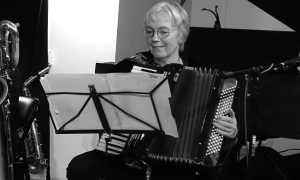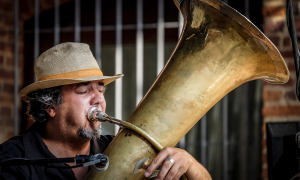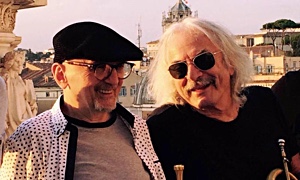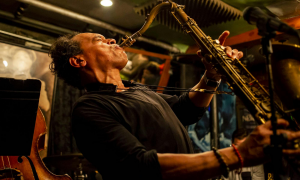Home » Jazz Articles » Musician 2 Musician » The Cry of Jay Rodriguez
The Cry of Jay Rodriguez

Jay Rodriguez
saxophoneThe Village Gate was a legendary venue full of jazz history. The main nightclub was downstairs, exactly where Le Poisson Rouge is now located. That's where "Salsa Meets Jazz"' happened and big acts played. Upstairs there was a small theater next to the atrium which was billed as the "Top O' the Gate." The session took place in the atrium which sat in a long narrow room with a shallow stage just big enough for a piano trio. The bar and tables lay parallel to the sidewalk behind a glass partition where one could people watch and listen to live jazz.
The Gate jam introduced me to a new and diverse group of musicians from all over the scene, many of whom were students. But it was saxophonist

Arnie Lawrence
saxophoneb.1938

Dizzy Gillespie
trumpet1917 - 1993

Spike Wilner
piano
Larry Goldings
organ, Hammond B3b.1968
That's where I met

Jay Rodriguez
saxophoneAll of that was on display when I stepped into the club to hear him last month. He was wrapping up a cadenza; a free style improvisation played at the end of a piece. Jay's style casts a wide net. In this brief flurry of solo playing on tenor he stuck to angular melodic motifs that tumbled and rolled into fast flurries quite reminiscent of

John Coltrane
saxophone1926 - 1967

Billy Martin
drumsb.1963
The next day I spoke with Jay about the show and soon after that I visited him in his Brooklyn apartment in Gowanus, Brooklyn where he lives with his wife Neven, their son Nile, a cocker spaniel and a cat. Married for 23 years, Neven and Jay have an enduring partnership, strengthened by life's obstacles, including Jay's battle with addictions. He's overcome all that and at 50, despite a busy life on the road, he looks at least a decade younger.
His latest album Your Sound just dropped on Whaling City Sound and he spoke with me about how this release came to be.
"
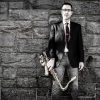
Matt Garrison
saxophone
Arturo O'Farrill
pianob.1960
After listening to Your Sound it appeared to me that the modern music genius of

Ornette Coleman
saxophone, alto1930 - 2015
"I've been playing with Al McDowell, Ornette's former bassist. Ornette's stuff is very deep and complex and very diatonic in one way, superimposition of triads and melodic stuff. You know when you have Bach and you can hear all the harmony in his lines? That's what I got from Ornette's thing, you could hear all the harmonies in his lines. Except, he was playing diatonically like the key didn't matter. So it has been an interesting thing over the last few years to explore that openness with Al, since he knows all of that phrasing so well."
For me the highlight of this album are Jay's compositions on which you can really hear his melodic imagination sing. During the opening track "Ghost Dancer/Congo Call," sinuous long phrases slither throughout the piece. Tenor saxophonist

Billy Harper
saxophoneb.1943
"It's haunted" Jay says when his fan turns on without explanation. Okaaay... I'm thinking, this is exactly what I want to hear.
I had checked out some videos of Jay playing with the Groove Collective back in the day and recognized a classic lick associated with the great saxophonist

Steve Grossman
saxophone1951 - 2020

Michael Brecker
saxophone, tenor1949 - 2007
"I think we gravitate to things that speak to us. That reminds me of summer days when my parents would play Charanga, a kind of Cuban music. A lot of Latin bands would play Salsa but also a lot of other kinds of music. It's also rhythm, it's like Ornette, I'd play clave but also find the notes inside the piano. I used to want the band to follow when I played through a chord but now I realize that doesn't matter anymore. We're in this place where we have this canvas we create and it is an amazing new thing to be able to do that. I think I've got a lot of that because of Al and Ornette. Because 99% of that has been self-acceptance. Self-acceptance as a musician, as a parent. That has been an amazing thing, knowing what you do, what your limitations are, what I have to work on.

Craig Harris
tromboneb.1953
I asked Jay, what he thought about the onslaught of musicians showing off their chops on YouTube. And how, despite all his schooling, he avoided copying other musicians.
"I just didn't have the same discipline. It was a combination of different factors. I didn't have the aptitude for that or I didn't have the patience for that. I gravitated to things and transcribed little things that I used and grew from that. I was around a lot of kids who studied piano and they played the hell out of all these Cuban composers. Everyone was studying the classics around me, mostly girls, because at the time it was the girls who would study piano. These YouTube videos remind me of "recital time" and when everyone would perform their works for each other. Now it's like that for jazz. If you practice something really well then... bring out the cameras! People are using YouTube and think it's the same. I think there's a whole thing when there's a lot of young people copying but it's not necessarily about someone posting some new shit they came up with -creating controversy -it serves a different purpose. What I learned later on was: I'm not 'that' but I'm this!
We talked about self-acceptance and that took a long time, along with getting sober, it was like a new exploration of self and trying to find that one thing that made me want to play again. Like when my little boy gets up and is like, 'Daddy let's wrestle' and it's on man, that's the gig! That's the song that day. For people dealing with drug addiction, that thing disappears. So if I'm not going to do this, I want to relate to this world the way it was before I started this thing. Maybe there was a lot of growing up to do. A lot of emotional things that connect with the music. And that's when the whole humanity thing kicked in with how I relate to the world as a father, as a musician and what that means."
Jay and I spoke about many saxophonists whom we revere and also discussed the importance of having a mentor, a personal relationship with a master.
"Today I don't see it as much...I don't perceive it as much. I think that's been the journey. I'm still working...there's so much to work on. With Ornette you were with a master teaching orally, it was a very natural thing. He would rehearse all day, old school"
Jay's ability to play a lot of instruments is admirable. I told him about the time I got to play at Jazz at Lincoln Center. I took the gig because the other band on the bill had the master soprano saxophonist

Steve Lacy
saxophone, soprano1934 - 2004
"Maybe it's our calling of sorts. We dealt with our circumstances. It's actually to our advantage because it strengthens our voice. I like that story about Lacy. I'm a big fan of the original Saturday Night Live band because they sound so great. I played with The Roots. It was really good to do it. I think we come from a generation where the music scene was different. When I was a kid there was this whole thing about doing studio work. I thought the only way to make money was to do everything and

Paquito D'Rivera
clarinetb.1948
After we spoke I began to recollect about so many good times we had together. Sunny days in the city when a friend would pick us up and we'd drive around for hours listening to the radio and talking about music. Or how we'd set a rendezvous time on the uptown platform and ride up to Harlem then go back to his loft in the flower district and practice together. Jay was working with the top Salsa stars of the day including

Tito Puente
drums1923 - 2000
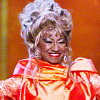
Celia Cruz
vocals1925 - 2003

Ray Barretto
congas1929 - 2006

Charlie Sepulveda
trumpetb.1962
Some years went by and Jay got busier playing with the Groove Collective,
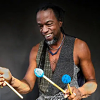
Bill Ware
vibraphoneb.1959

Medeski Martin & Wood
band / ensemble / orchestrab.1991
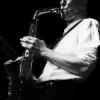 "
data-original-title="" title="">Lounge Lizards and we didn't see much of each other for a long time. However there was a sax quartet gig that I'll never forget at St Mark's Church. He came in at the last minute with his old baritone sax. It was barely holding together and during the concert it completely stopped working. These things happen so we saxophonists often use whatever is available and improvise a repair to get through the gig. Jay asked out to the audience if anyone had a rubber band. A gentleman got up and walked up to the bandstand and pulled from his pocket what appeared to be a baseball sized roll of rubber bands. Rubber bands of every size and shape! It was just the type of luck that Jay would have. After that he played a solo that raised the roof. Maybe it was a little theatrical but he sure connected with that audience in a beautiful way.
"
data-original-title="" title="">Lounge Lizards and we didn't see much of each other for a long time. However there was a sax quartet gig that I'll never forget at St Mark's Church. He came in at the last minute with his old baritone sax. It was barely holding together and during the concert it completely stopped working. These things happen so we saxophonists often use whatever is available and improvise a repair to get through the gig. Jay asked out to the audience if anyone had a rubber band. A gentleman got up and walked up to the bandstand and pulled from his pocket what appeared to be a baseball sized roll of rubber bands. Rubber bands of every size and shape! It was just the type of luck that Jay would have. After that he played a solo that raised the roof. Maybe it was a little theatrical but he sure connected with that audience in a beautiful way. He still dreams of having a music school where he was born in Barranquilla, Colombia. I always felt that Jay's talent was equally matched by his passion. He can tap into a mysterious kind of wisdom that allows one to grasp the essence of humanity. Even if that thing he speaks of can only be realized for a split second, it is far worth the effort, and more. As Jay so eloquently phrases it in his liner notes to Your Sound:
"There was a time long ago, I was told, that one could hear the murmur of the stars. This is what my song, 'your sound' is about. But that is just my sound and thoughts about it. We will all hear different things within. Listen for your sound in it.The sound in me is vibrating and speaking with the sound in you. 'Your Sound' is sacred. I wish you 'Your Sound' and your awareness of it in your terrestrial lifetime and beyond."
Photo credit: William Brown
Tags
Musician 2 Musician
Jay RODRIGUEZ
Ludovico Granvassu
Arnie Lawrence
Dizzy Gillespie
Spike Wilner
Larry Goldings
John Coltrane
Billy Martin
Matt Garrison
Arturo O'Farrill
Ornette Coleman
Al McDowell
billy harper
Steve Grossman
Michael Brecker
Craig Harris
Steve Lacy
Paquito D'Rivera
Tito Puente
Jose Alberto
Celia Cruz
Ray Barretto
Bill Ware
Medeski, Martin and Wood
Lounge Lizards
Comments
PREVIOUS / NEXT
Support All About Jazz
 All About Jazz has been a pillar of jazz since 1995, championing it as an art form and, more importantly, supporting the musicians who make it. Our enduring commitment has made "AAJ" one of the most culturally important websites of its kind, read by hundreds of thousands of fans, musicians and industry figures every month.
All About Jazz has been a pillar of jazz since 1995, championing it as an art form and, more importantly, supporting the musicians who make it. Our enduring commitment has made "AAJ" one of the most culturally important websites of its kind, read by hundreds of thousands of fans, musicians and industry figures every month.


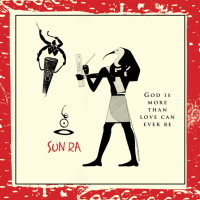
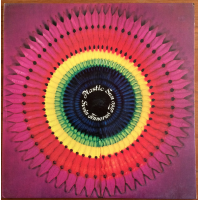



 Buy Now
Buy Now




